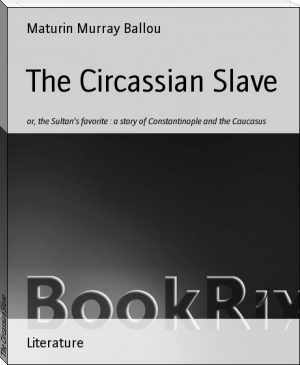The Duke's Prize by Maturin Murray Ballou (popular books of all time TXT) 📕

- Author: Maturin Murray Ballou
Book online «The Duke's Prize by Maturin Murray Ballou (popular books of all time TXT) 📕». Author Maturin Murray Ballou
The uncle's darling project was utterly defeated, and the hopes thereby of securing himself from his just reward for the dishonest act he had committed in appropriating a large sum of his niece's property, was rendered abortive. What course did the old man pursue in this dilemma? He did that which he should have done years before, as soon as he awoke to the realization of the crime he had committed; he went to Florinda, confessed his dishonesty, and begged her to spare his gray hairs from dishonor. She was but too happy to relieve him from his misery and suffering on this account.
"Uncle," said she, "give thyself no further uneasiness on this point, but sit thee down, and draw a paper absolving thyself from the matter in proper form, and I will sign it."
The paper was drawn and signed, and Signor Latrezzi from that hour became a different man; he had thoroughly repented.
"You are now content?"
"I am, my dear Florinda, and thankful to you for thus relieving my mind."
"Say nothing about it, my dear uncle."
"I will not, save in action towards you, Florinda, who have placed me under lasting obligations."
Though Carlton deeply regretted the fatal occurrence of that night at the inn on the Apennines, still his conscience did not upbraid him for the part he had enacted; for though he had taken the life of Petro, it was done in self-defence, and the court of Florence so decided, Carlton having given himself up to trial. It would have gone hard with him, or any foreigner in Italy, and especially in Tuscany, who should chance to be thus situated; but Carlton had the all-powerful influence of the Grand Duke Leopold exerted in his favor, and in this case justice was rendered.
True, it was some time before the American artist was again received at court, or made his appearance at the Grand Duke's weekly cordon, as public opinion was against him-and very naturally, too, for he was a foreigner, and had taken the life of a citizen of Florence, and one closely allied to the nobility and gentle blood. But after the decision of the court-which the duke took good care to have made in the most imposing and public form-was thoroughly understood, and the memory of the matter had grown a little dim, Carlton again resumed his place at court, as the protege of the Grand Duke, and royal favor was again shown him.
Signor Latrezzi shut himself from society for many months almost broken-hearted, now fully realizing the error of his conduct in relation to Florinda and Petro. The generous act of the former in absolving him from the responsibility he had incurred in relation to her estate, had done much to awaken his better feelings. Petro he had loved with the affection of a father, and he now keenly mourned his untimely end. People saw the great change in Signor Latrezzi, for he no longer sought to oppress any one, but in his few public dealings he was strictly honorable and true.
He had indeed thoroughly reformed; he no longer sought to interfere in the plans of his niece, who was left to follow her own wishes. Out of respect for her own feelings, and those of her uncle-whom Florinda had now begun to respect, seeing a complete change in him that showed an honest and honorable purpose-her proposed marriage was deferred for some weeks, when at length, under the sanction of the Grand Duke, Florinda and Carlton were united to each other, and found happiness in the love and constancy of their own true hearts. Thus happily ended the high thoughts and bright dreams of the humble painter.
In one of the lovely palaces whose lofty walls of white bask in the warm sun of the Val d'Arno, lives the last surviving branch of the noble house of Carrati in the person of the peerless Signora Florinda. Joyful and happy in domestic felicity, there, too, is Carlton, the American artist, surrounded by everything that wealth can procure, or refined taste suggest, and master of the unbounded estates of Carrati, but above all, happy in Florinda's love.
THE END.
[FROM "THE FLAG OF OUR UNION."]
THE PRIMA DONNA.
BY M. V. ST. LEON.
"WHAT is to be done?" exclaimed the manager of the principal theatre in Havana. "What is to be done?" and he paced the room in angry despair. "This is the second time within a week that Signora Buonatti has been too ill to sing-and to-night every seat is engaged, the house will be full to overflowing. The audience scarce endured the first disappointment, and how will they receive the second? O, for some expedient. I must hunt the whole city through till I find some one to supply her place decently!" and seizing his hat, Diego Cartillos rushed into the street, and was out of sight in a few minutes.
"Alfin brillar, nell i rede," sang a voice of surpassing sweetness, which came from round a corner. Cartillos stopped an instant in silent ecstacy, and then hurriedly advanced in the direction of the sound. In front of a handsome house stood a young girl apparently near sixteen years of age, in poor but clean garments, and holding a mandoline in her hand with which she was playing an accompaniment to the words she was singing. The manager stood listening to it attentively, and as the rich, clear tones of the girl dwelt on the lower notes, or rose with a birdlike gush to the higher ones, he could scarce restrain some display of his delight. Such, however, it was not his policy to exhibit, and when at the close of the song, she timidly approached him, and, lifting her mandoline and large, sad eyes at the same time, besought him in broken Spanish to give her a single maravedi for pity's sake, he coldly drew forth a few small coins and handed them to her.
"This is a poor way of earning your support,"' answered he.
"I know it-but it is all the one I have."
"It is a pity, for you seem to be an honest sort of a body, and perhaps with the assistance of friends you might be made something decent," then without noticing the indignant flush that had risen to her check, he continued. "Now I am willing to help you-that is, if you're respectable and humble-minded, and I will let you sing in my theatre, although I am sure I shall lose by it."
The first impulse of the young girl was to refuse with anger, the proposal offered almost in an insulting manner, by the hard, avaricious man, but a moment's reflection showed her she could not afford to be particular in choosing the manners of an employer, and she replied:
"Why are you willing to take a stranger who has no claims upon you, if you are certain you will be a loser by so doing?"
"Because, although I shall be at an extra expense for a while, I am in hopes you will repay it sometime," he replied, with a scowl at being questioned. "Come, what say you?"
"I am willing to better my condition, sir, and as for being humble in my manners, few are otherwise who have their living to earn," replied the maiden, with a touch of haughtiness.
"Then come with me," said Cartillos, leading the way to the house he had quitted a short time previous. When they were seated, the manager commenced questioning his companion.
"It is rather a singular thing for a street musician to sing such songs as you do, and in such a manner,"--then, after a pause, during which she did not volunteer any information on the subject, he renewed the attack, with, "You must have had some instruction. Who was your teacher?"
"A countryman," was the reply.
Baffled in this direction, Cartillos commenced in a fresh quarter.
"You are an Italian, I suppose?"
"I am."
"Of what part are you a native?"
"Before I came to Havana, I resided in Naples."
The manager bit his lip at the small amount of information he obtained, and commenced again.
"One of the troupe is ill, and I wish to obtain some one to supply her place-but I suppose you are unacquainted with any opera?"
"I will engage to perfect myself in any one within a week."
"I cannot wait so long. To-night is the evening I most desire your services," Cartillos replied, in despair.
"What is announced in the programme?"
"Lucia," was the gloomy response.
"If that is all, sir, I ask but seven hours practice and study. I am familiar with it, but need instruction in the acting of it."
Her companion eagerly replied that he would engage her for that night at least, and was departing to send some one to instruct her, when she timidly inquired:
"But my dress, sir-how shall I arrange that matter?"
"O, I'll see to that! You prepare yourself in the part-I'll do the rest," and he was gone in an instant.
Night came, and also a crowded house. Presently the people became impatient, and with eagerness called for the commencement of the performance; at the expiration of five minutes whistling, screaming, stamping, etc., the manager made his appearance and announced "that Signora Buanatti was unable to appear, but Signorina Zampieri had kindly offered to take her place!" But the audience did not take it kindly-the lady was unknown to them, and who could say anything about her singing-besides, they had excused the favorite vocalist once, and they were not to be put off in this same way again. Accordingly, a tremendous hiss arose, in the midst of which the unfortunate manager rattled off the physician's certificate, letting his voice drop, and flat away towards the end most comically, then hastily departed for the side scenes.
In a few minutes the young debutante appeared. She was received with a chilling silence, broken only by a few faint claps from some half dozen good-natured persons, in consideration of her youth and beauty. In defiance of her prepossessing appearance, the audience seemed determined that they would not be cheated or flattered into a single expression of approbation, but the manager observed with rising hope that they forbore to hiss. Undismayed, and regardless of the reception she met with, the young girl, with perfect composure, began her role. As she continued, the whole richness and beauty of her voice were brought out, and wholly unable to withstand such wonderful, unexpected melody, the people manifested their delight loudly, and at the conclusion of the opera, Signorina Zampieri was called for loudly. At the request of the manager, she came forward, and with polite indifference bowed in reply to the applause. Signora Buonatti was forgotten! The people were amazed at the nonchalant manner of the young favorite, who actually received a burst of enthusiasm, such as rarely had greeted any singer, with such coolness-who and what was this slender, youthful being, that was neither awed by their sternness, nor delighted at their praises?
The selfish, scheming Cartillos at once perceived he had made a fortunate speculation, and hastened to engage his prize for a year at one third her real value, as the next day





Comments (0)